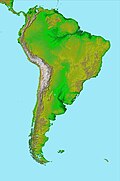Sobral Fault
Appearance
The Sobral fault is a major fault in the Borborema geological province of northeastern Brazil, a part of the Transbrasiliano lineament. It is commonly correlated with the Kandi fault in Benin, east of the West African craton.[1] The fault lies in the northwest of Ceará state. It appears to have formed late in the orogeny when the West African craton engaged with the Congo craton, and to have allowed significant dextral strike-slip movement. It was reactivated when South America was breaking away from Africa.[2] In this later phase, a sinistral shear movement of about 100 km seems to have taken place during and after the break-up.[3]
References
[edit]- ^ Robert J. Pankhurst (2008). West Gondwana: pre-Cenozoic correlations across the South Atlantic Region. Geological Society. p. 93. ISBN 1-86239-247-1.
- ^ R. CABYl, A. N. SIAL2, M. ARTHAUD3,and A. VAUCHE (1991). "Crustal Evolution and the Brasiliano Orogeny in Northeast Brazil" (PDF). EFPE. Retrieved 2011-01-31.
{{cite web}}: CS1 maint: multiple names: authors list (link) CS1 maint: numeric names: authors list (link) - ^ J D Fairhead, Nasreddine Bournas and M Chaker Raddadi (2007). "The Role of Gravity and Aeromagnetic Data in Mapping Mega Gondwana Crustal Lineaments: the Argentina - Brazil – Algeria (ABA) Lineament" (PDF). SEG. Archived from the original (PDF) on 2011-07-11. Retrieved 2011-01-30.

